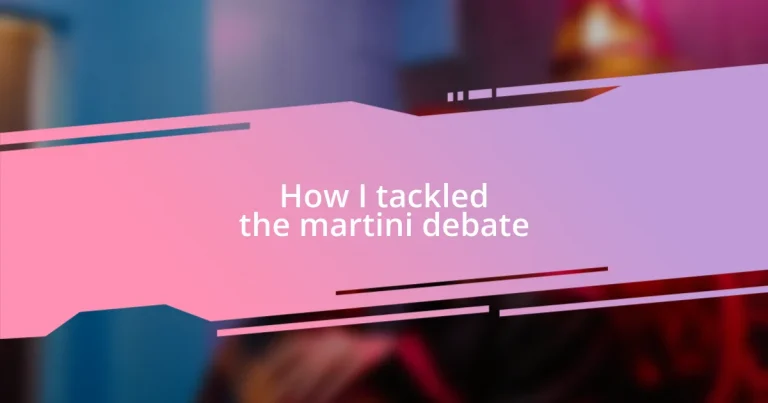Key takeaways:
- The martini debate showcases personal preferences in cocktail culture, reflecting individual tastes and connections to food and drink.
- Classic martinis are valued for their simplicity, versatility, and cultural significance, symbolizing sophistication and shared experiences.
- Modern interpretations of martinis promote creativity and foster social connections, highlighting the evolving nature of cocktail culture.

Understanding the martini debate
The martini debate often revolves around the classic question: “Is a martini supposed to be shaken or stirred?” For me, this question brings back memories of sitting at a bustling bar, comfortable in the dim light, as I listened to friends passionately argue for each method. It’s fascinating how a simple drink can evoke such strong opinions, isn’t it?
As I engaged in these discussions, I realized that the martini symbolizes more than just a cocktail; it represents personal taste and the nuances of how we connect with food and drink. When someone enjoys a shaken martini, they might appreciate the frothy texture and chill, while those who prefer it stirred may savor the purity of the spirits, letting each sip tell a story. Have you ever thought about how preferences can reflect our unique personalities?
Ultimately, the martini debate highlights our tendency to cling to tradition while also embracing innovation. I recall a particular evening where a friend insisted that only a classic gin martini, garnished with a twist, could ever be authentic. Yet, on that same night, we discovered a delightfully unexpected olive-infusion that took the group by surprise, proving that even in the realm of cocktails, there’s room for evolution. Isn’t it interesting how a conversation over drinks can lead to a deeper understanding of each other’s perspectives?

Key arguments for classic martinis
To truly appreciate the classic martini, we must first consider its time-honored simplicity. The combination of gin and dry vermouth creates a balanced flavor profile that showcases quality ingredients. I remember sipping my first martini and being struck by its clean taste—nothing masked or overwhelmed, just pure elegance in a glass. The vivid memories of that moment still make me appreciate a well-crafted classic.
Another compelling argument for classic martinis is their versatility. While the traditional recipe may appear straightforward, the choice of gin or the type of vermouth can alter the drink’s character dramatically. I once attended a tasting where we sampled various vermouth brands alongside the same gin; it was astonishing to see how different botanicals could evoke new flavors. This flexibility allows classic martinis to suit a wide range of palates while maintaining their iconic status.
Lastly, there’s an undeniable cultural significance tied to the classic martini. For many, it represents sophistication and has been an emblem of celebration since the early 20th century. I recall enjoying a martini during a significant milestone in my life, feeling an overwhelming sense of achievement with each sip. It’s moments like these that imbue the drink with personal meaning, making the classic martini not just a cocktail, but a part of our shared experiences and memories.
| Argument | Description |
|---|---|
| Simplicity | Balanced flavor profile with quality ingredients. |
| Versatility | Choice of gin and vermouth alters the drink’s character. |
| Cultural significance | A symbol of sophistication and celebration in shared experiences. |

Exploring modern martini variations
Modern variations of martinis have truly transformed this classic drink into a canvas for creativity. During a recent cocktail night with friends, I was captivated by a lavender-infused martini. The floral aroma had an enchanting quality that took me back to a summer garden, evoking feelings of warmth and nostalgia. This bold approach really highlights how today’s mixologists are remixing tradition to reflect contemporary tastes and trends.
- Espresso Martini: Combining coffee and vodka for a bold, energizing twist, perfect for late-night gatherings.
- Fruit-Infused Martinis: From raspberry to pineapple, these add a sweet, vibrant flair that challenges the norm.
- Dirty Martini Variations: With garnishes like blue cheese-stuffed olives, this adds a savory punch, appealing to adventurous palates.
- Vegan Martinis: Utilizing plant-based ingredients, these variations cater to a broader audience without sacrificing flavor.
As I sipped on a cucumber-mint martini at a trendy rooftop bar, I realized how these modern interpretations not only refresh the drink but also bring people together. The cool cucumber complemented by fresh mint was nothing short of a summer escape, offering a unique experience that sparked lively discussions among us. It’s refreshing to see a cocktail that fosters exploration and connection, demonstrating how martinis can evolve while weaving stories that resonate with our changing lifestyles.

Personal experiences in cocktail culture
I’ve found that my own journey through cocktail culture has been quite the adventure. One memorable evening at a cocktail festival, I stumbled upon a gin bar featuring artisanal brands I had never encountered before. Trying out a small-batch gin called “Alpine Dew,” I was amazed by how its herbal notes danced on my palate. Have you ever tasted something that so perfectly captures a place and time? That moment, surrounded by fellow enthusiasts swapping stories, solidified my appreciation for the artistry behind cocktails.
I’ve also noticed how cocktails often serve as conversation starters. At a friend’s birthday party, someone brought an unusual mezcal martini. The smoky flavor took me by surprise, and as I took my first sip, I involuntarily blurted out, “Wow, this is like drinking a campfire!” Laughter erupted around me, instantly breaking the ice with strangers. Experiences like that have made me realize how cocktails can connect people, weaving threads of common interest among diverse backgrounds.
Reflecting on my favorite cocktail experiences, I can’t help but think about the myriad of emotions they evoke. I once enjoyed a beautifully crafted classic martini while celebrating a close friend’s promotion. As we toasted, the crisp taste of the martini mirrored the clarity of our joy that night. Isn’t it fascinating how a simple cocktail can hold the power to encapsulate life’s milestones? These personal connections with cocktails highlight the profound role they play in our lives, making each sip a vessel of shared memories.

Conclusions on the martini debate
When I consider the martini debate, I realize it’s less about a definitive answer and more about personal preference. One evening, while playing bartender for friends, I experimented with a classic versus a trendy twist, like a spicy jalapeño martini. The laughter and spirited discussions that followed were a reminder that the joy of martinis lies in their diversity and the stories shared over them.
Another conclusion I’ve drawn is that the martini can symbolize individual identity and taste. During a dinner party, guests paired their meal with their preferred martini style, from dry to dirty, showcasing their unique flavor profiles. This moment made me reflect: does the drink we choose say something about us? We often select cocktails that resonate with our personalities, turning simple choices into declarations of self.
Ultimately, the martini debate reveals the fluid nature of cocktail culture. One evening, while sipping a martini with a twist of grapefruit, I pondered how our palates evolve alongside us. Each twist and variation invites exploration, proving that even a classic like the martini can remain relevant by adapting to our ever-changing tastes. Isn’t it exciting to think about where the martini will go next?














